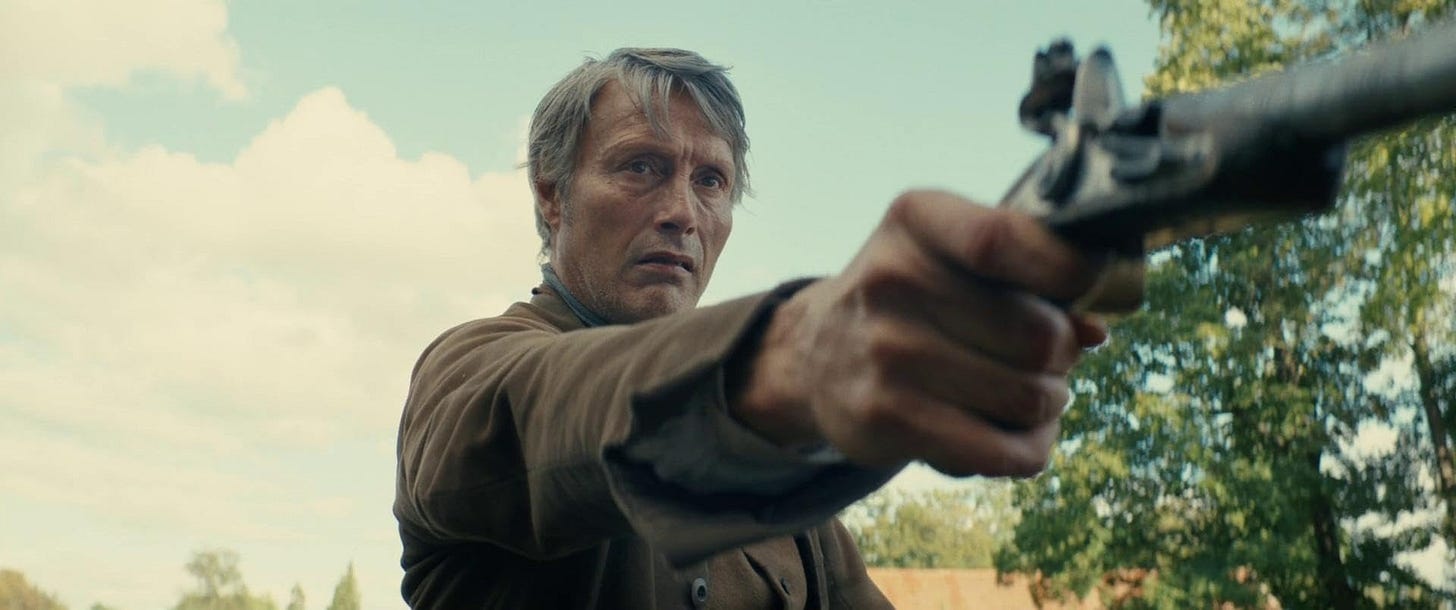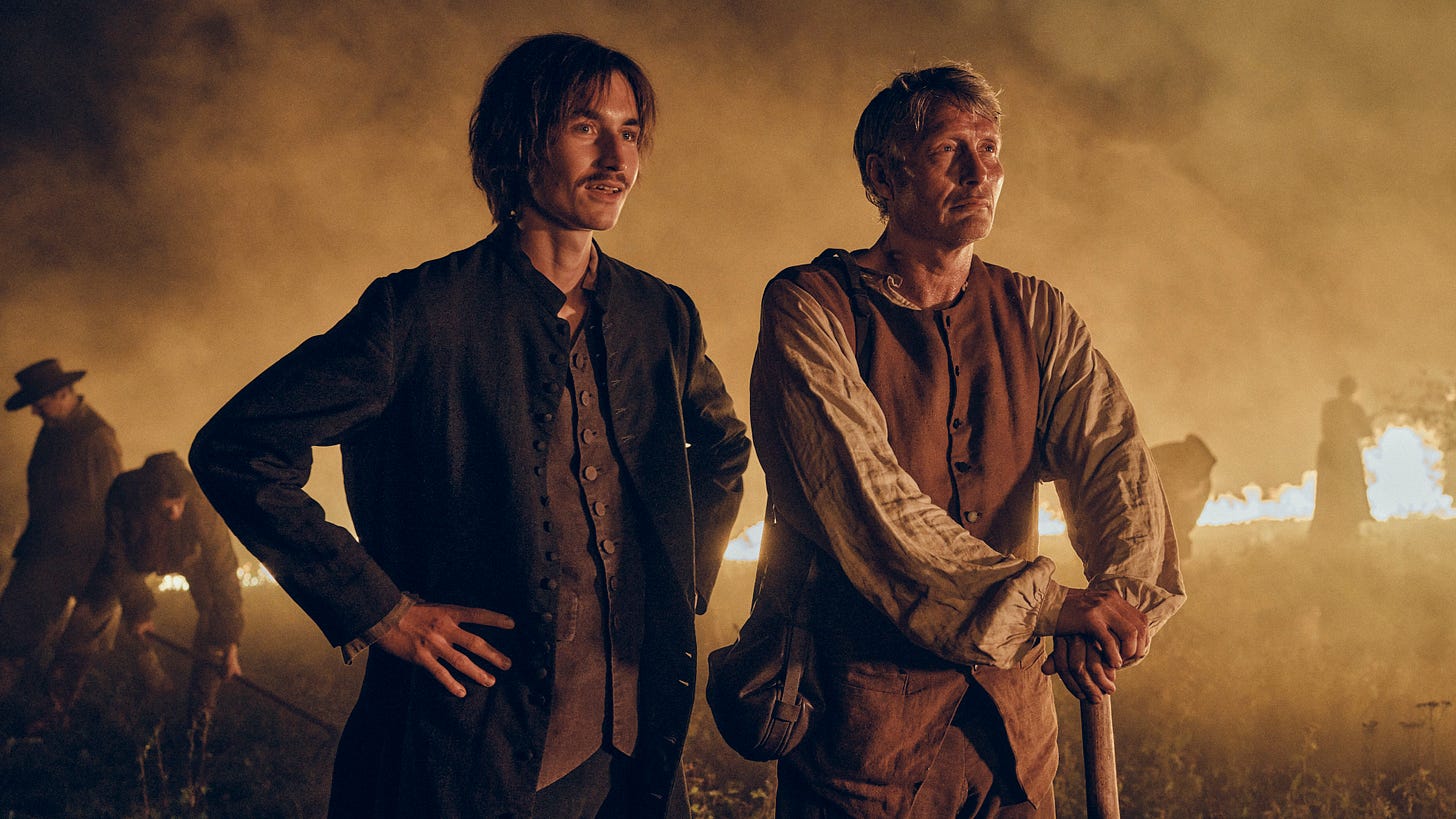‘The Promised Land’ Review
A Danish Western asks what shall it profit a man?
A BAREBONES DESCRIPTION OF The Promised Land, Denmark’s entry in the competition for Best International Feature Film in this year’s Oscars, makes it sound like a revisionist Western of the American variety: an impoverished soldier heads out to a barren countryside crawling with outlaws to tame it, but must turn to violence when landowners seek to evict him and claim his gains for their own.
And those elements are certainly there. Mads Mikkelsen plays Captain Ludvig Kahlen, who exits a poorhouse for veterans in 1755 with a plan backed by Denmark’s king to turn part of the country’s vast heath—unused due to the poor soil and roving bands of Tater criminals—into a thriving settlement. He has trouble with the land; it is more dust than soil, and covered with tough-to-remove heather. He has trouble with the outlaws; they use the cries of children to bait him into murderous traps. And he has trouble with a landowner; Frederik de Schinkel (Simon Bennebjerg) is a cruel landlord whose luxurious estate neighbors the heath that Kahlen hopes to claim for himself when the king gives up on settling it.
Those looking for a pure Western, classic or revisionist, will be mildly disappointed by The Promised Land. Yes, there are some gun fights, but it does not build to a great swell of violence, cathartic or otherwise. The film’s Danish title, Bastarden (The Bastard), gives a better sense of what director Nikolaj Arcel (who cowrote the screenplay with Anders Thomas Jensen) is up to here. Kahlen is a bastard, the offspring of a lord and a maid, sent off to fight in the German army when he came of age. De Schinkel is the legitimate offspring of a different lord, but one who sees his half-brothers in Kahlen’s eyes and despises him for that recognition.
This is a movie about class and the limitations of class; about the freedom that comes with a noble title and even glancing recognition from the king; about the usefulness of law to those who have connections and the uselessness of law to promote true equality. Whereas the traditional American Western understands that in a new world like the untrammeled West, rights flow not from the tip of a pen but from the barrel of a gun, in the old world—the distant European world, the world of castes and castles—there are still kings. There’s nowhere to flee to, no freedom to be found.
I don’t intend to make The Promised Land seem dour, as it isn’t; it sparks with a wicked energy, particularly when Kahlen comes into conflict with de Schinkel and his men. Bennebjerg feels like a cross between Matt Smith (Dr. Who, Morbius) and Crispin Glover (Back to the Future, Willard); he has a narrow, almost feral face, and cruelty dances in his eyes. That he finds joy in torturing his tenant farmers is clear; that no one in this feudal society has the ability to stop him is what makes him terrifying.
Again: class, class is the thing here. Kahlen draws together an unlikely band of outsiders to form his homestead. There are Ann Barbara (Amanda Collin) and Johannes Eriksen (Morten Hee Andersen), a maid and farmer who fled de Schinkel and work illegally for Kahlen. They are joined by Anmai Mus (Melina Hagberg), a mixed-race child who Danish peasants are convinced is half-devil thanks to her darker skin. They are drawn together by priest Anton Eklund (Gustav Lindh), who seems to think that religion can transcend the strictures we see everywhere onscreen. Eventually, Kahlen is forced to choose between this newly forged family and his aspirations, and the choice he makes is as preordained as it is heartbreaking.
Director Arcel has shot an epic for the big screen; the Danish heath’s vistas are as sweeping as David Lean’s compositions of the Irish countryside in Ryan’s Daughter, if slightly more barren. At one point, Kahlen and a team of men are burning the heather to render the land more amenable to planting and the image harks back to Terrence Malick’s Days of Heaven, the heat of the fire curling the image, the orange and red contrasting sharply against the black of the night.
I can assure you that this is also a movie that it pays to see in the confines of a theater, where distractions are light and cell-phone use is discouraged. The Promised Land is not exciting but it is captivating, if you let it be. That most viewers will wind up watching it at home is unfortunate though, I guess, inevitable, given that it’s only playing on 200 or so screens. But if it’s playing near you, I hope you track it down. There isn’t much else in theaters worth seeing now anyway.




